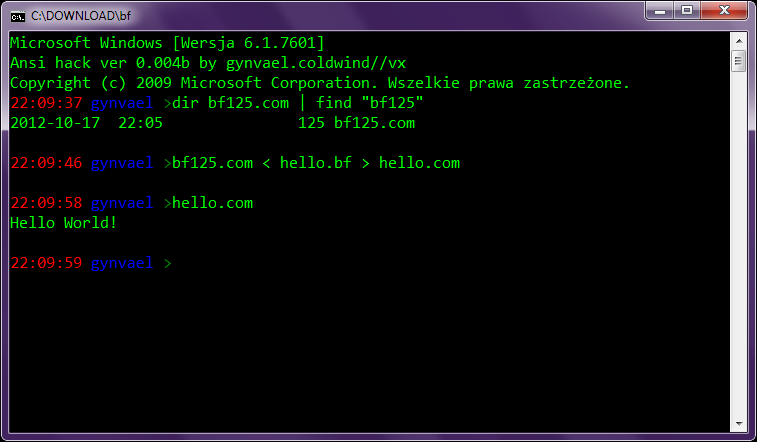A long time ago (in 2006) on a random IRC channel a friend of mine (fr3m3n, Hi!) came up with an idea, to make a compo (competition) for "the smallest
Brainfuck compiler". The rules were:
- The BF input source code was to be read from stdin.
- The output executable was to be a DOS com file.
- The output was to be written out to stdout.
- The compiler had to properly compile three test files, out of which the last one was a bf hello world:
++++++++++[>+++++++>++++++++++>+++>+<<<<-]>++.>+.+++++++..+++.>++.<<+++++++++++++++.>.+++.------.--------.>+.>.
- The compiler with the smallest compiler executable file wins! (the size of compiler-source-bf file and the size of the source code of the compiler did not matter).
- (I don't remember now, but there were some rules about what can be assumed about the initial registry values)
I don't have to add that we all went for creating .com-compilers as .com files, right? :)
The contestants were
j00ru, adam_i, fr3m3n and yours truly, and the results were (not sure if these were the final ones - these are the ones I found on my HDD):
- adam_i, 126 bytes
- j00ru, 163 bytes
- me, 125 bytes
- fr3m3n, 140 bytes (+-3 bytes, I used a different compiler now to compile his code)
However the order of the results is of no importance here, since all of the codes were quite impressive and used a lot of hacky assembly code.
That said, I did find my source code on the disk (actually I found the sources for all the entries, but I need to ping the authors whether I can publish them), so I decided to post it here (scroll down if you're interested).
A couple of notes about this though. But first, a proof it works on Windows 7 NTVDM:

Sadly, that's not the case for DOSBox - it generates some faulty code and hangs. I did not dig into the details, but probably it has something to do with the assumptions about the initial values of the registers or flags.
Furthermore, the compiler works OK with the hello world code from the rules, and with a few more simple programs. That said, it doesn't generate proper code for more complicated code. Again, I did not dig into this, so I don't know why. By design it should be a proper compiler, but I guess something went astray during the executable-size-optimization process.
Still, I decided to post this as a note, since someone might find some ideas I used in the code entertaining. You can also compare differences between versions to see how exactly the size optimization was achieved (see link below).
(random note to self: we must repeat a similar compo some day; this one was fun :)
UPDATE: Peter Ferrie made a 109 byte version. This is getting serious ;>
Appendix: Gynvael's bf125.com
Note: Other versions (source + binaries) and the test file are available
here.
[bits 16]
[org 0x100]
; assume bp=091e used
; assume di=fffe
; assume si=0100
; assume dx=????
; assume cx=00ff used
; assume bx=0000 used
; assume ax=0000 used
; assume sp=fffe
; -------------------------------------
start:
;mov al, code_start_end - start
mov al, code_nothing - start
code_start:
mov ch, 0x75
push cx
mov di, cx
rep stosb
pop di
jmp short code_start_end
; -------------------------------------
find_right:
pop bx
;assume cx = 0
xor [di], cl ; prev: test byte [di], 0xff
jnz short loop_right_end_2
inc cx
loop_right:
inc bx
mov al, [bx]
cmp al, 0xC3 ; ret
jne short loop_right_sth
dec cx
jz short loop_right_end
loop_right_sth:
cmp al, 0xBB ; mov bx
jne short loop_right
inc cx
jmp short loop_right
loop_right_end_2:
; stupid nasm can't do good lea
; lea ax, [bx - 5]
db 0x8d, 0x47, - (code_sqleft_next_end - code_sqleft_next)
push ax
loop_right_end:
inc bx
push bx
code_sqright:
code_sqright_next:
ret
code_sqright_next_end:
code_start_end:
db '$'
db 0xff
; -------------------------------------
real_start:
; create lookup table
; mov byte [di+'+'], code_inc - start
; stupid nasm can't make mov byte [di+byte '+'] --;
;db 0xC6, 0x45, '<', code_left - start
inc byte [di+'<']
;db 0xC6, 0x45, '>', code_right - start
dec byte [di+'>']
db 0xC6, 0x45, '[', code_sqleft - start
db 0xC6, 0x45, ']', code_sqright - start
lea sp, [di+45+2]
push (code_dec - start) + (code_dot - start) * 256
push (code_inc - start) + (code_comma - start) * 256
; assume sp 43
; startup code
mov dx, code_start
jmp short write
pre_write:
; switch
xchg al, bl
mov dl, [di+bx]
write:
; write
mov ax, bp
; mov ah, 9
int 0x21
; read
mov ah, 0x06
mov dl, 0xff
int 0x21
jnz pre_write
;-----------------------------------------------
the_end:
mov dl, code_end - start
;mov dx, code_end
;mov ah, 9
mov ax, bp
int 0x21
code_end:
mov ah, 0x4c
int 0x21
code_inc:
inc byte [di]
db '$'
code_sqleft:
code_sqleft_next:
mov ax, 0x100 + find_right - code_start
call ax
code_sqleft_next_end:
code_right:
inc di
code_nothing
db '$'
code_left:
dec di
db '$'
code_dec:
dec byte [di]
db '$'
code_comma:
mov byte [di], 0xff
code_dot:
mov dl, [di]
mov ah, 6
int 0x21
mov [di], al
db '$'

